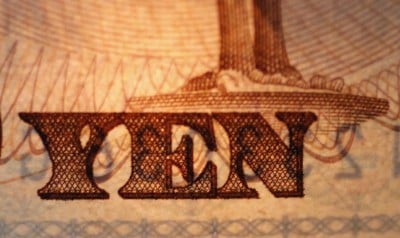 © Reuters. USD/JPY -0.97% Add to/Remove from Watchlist Add to Watchlist Add Position
© Reuters. USD/JPY -0.97% Add to/Remove from Watchlist Add to Watchlist Add Position Position added successfully to:
Position added successfully to:
Position added successfully to:
Position added successfully to:
Position added successfully to:
Position added successfully to:
Position added successfully to:
Position added successfully to:
Investing.com-- Most Asian currencies moved little on Thursday as markets remained on edge before key U.S. labor data, while the yen appreciated as Bank of Japan Governor Kazuo Ueda offered more cues on a potential pivot away from the bank’s ultra-dovish stance.
The dollar also steadied in Asian trade, retaining recent gains as markets awaited more cues on when the Federal Reserve planned to begin trimming interest rates.
The yen was the best performer in Asia for the day, rising 0.4% after Ueda flagged more challenges for the BOJ in the coming months, and also spoke about options the bank had when considering a pivot away from negative interest rates.
His comments reinforced expectations that the BOJ will wind down its ultra-dovish, stimulus-heavy policies in the coming year. But uncertainty over the timing of the pivot still kept traders wary.
Gains in the yen were still held back by Ueda stressing on the need for loose policy in the near-term, especially amid signs that the Japanese economy was cooling further.
The Chinese yuan was steady on Thursday after data showed a bigger-than-expected improvement in China’s trade surplus through November. Chinese exports rose for the first time in six months, albeit marginally.
But an unexpected drop in imports pushed up concerns over cooling domestic demand, especially as economic activity in the country remained languid. A string of readings for November, released earlier this month, pointed to sustained weakness in China’s economy.
Markets were also watching for any more currency market intervention by the Chinese government, after several state banks were seen selling dollars for yuan on the open market.
Concerns over China kept most other Asian currencies trading in a flat-to-low range. The Australian dollar fell 0.3% as data showed weaker-than-expected growth in the country’s trade surplus in October, as exports remained weak.
The rate-sensitive South Korean won sank 0.6%, while the Thai baht fell 0.4% as inflation touched a 33-month low in November.
The Indian rupee remained an outlier among its Asian peers, hovering close to record lows before a Reserve Bank of India meeting on Friday.
The dollar index and dollar index futures moved little in Asian trade, but held above the 104 level after rebounding over the past week.
While the Fed is widely expected to keep rates on hold in December, markets were uncertain over when the bank plans to begin trimming rates. This uncertainty aided the dollar, even as ADP payrolls data pointed to more cooling in the labor market.
But nonfarm payrolls data due on Friday is expected to provide definitive cues on the labor market, and will likely factor into the trajectory of the dollar for the remainder of the year.